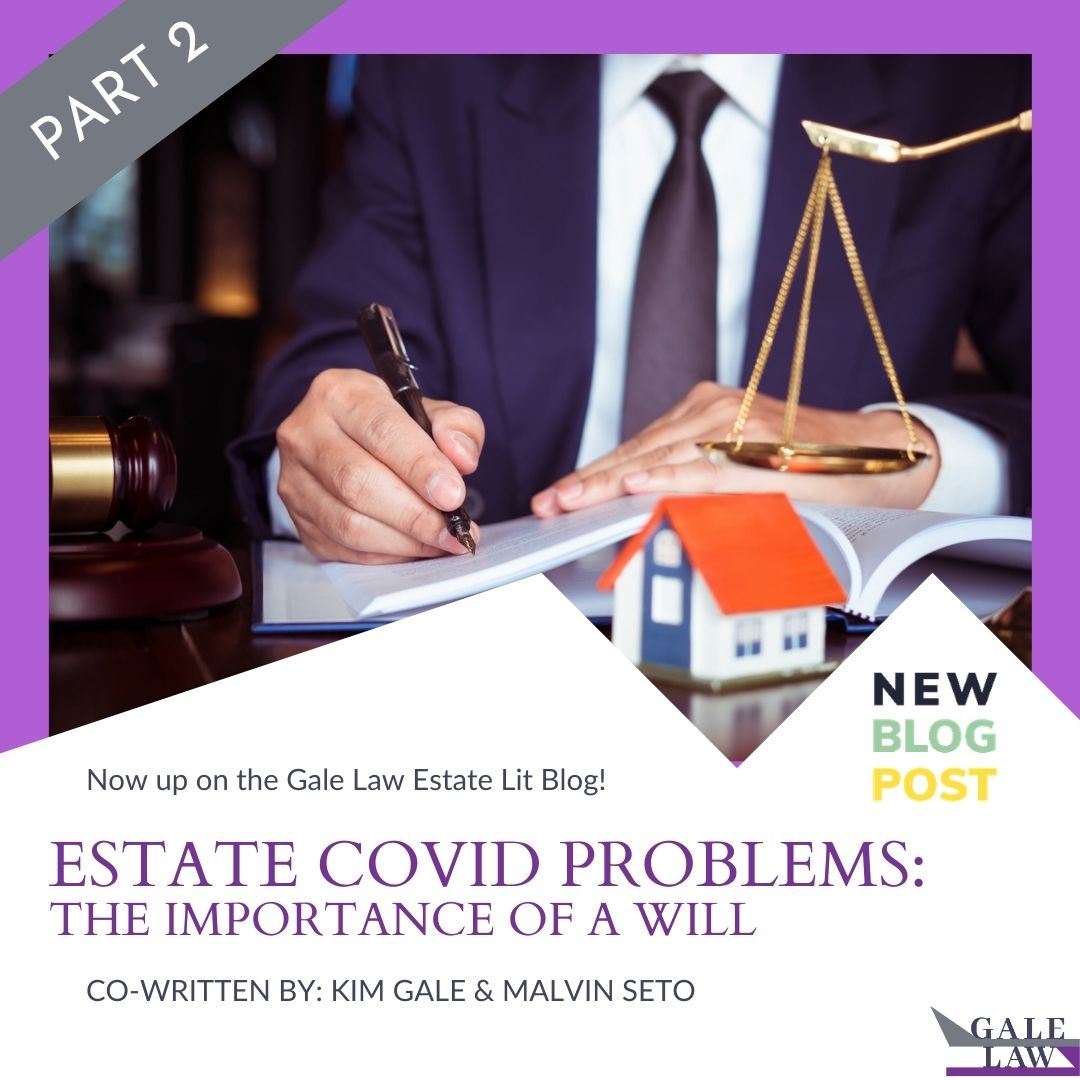 Estate COVID problems part two: The importance of a will
Estate COVID problems part two: The importance of a will
A common theme executors and loved ones are faced with is when their loved one dies without a will, also called dying intestate. In the first article in this series we wrote regarding the intestate succession process when a person dies without a will. Many issues arise when one dies intestate and family members may find themselves in litigation.
As of today, COVID-19 has killed over 2.35 million people worldwide. In these unprecedented times, it is imperative to consider estate planning so loved ones are left with a clear plan as to the administration of an estate and can take advantage of any tax savings. A will is a crucial aspect of estate planning.
COVID-19: Remote execution of will
Prior to the COVID-19 pandemic, a testator was required to have their will witnessed in the physical presence of two people. The government of Ontario responded to the COVID-19 pandemic with the regulation for Signatures in Wills and Powers of Att orn ey. This regulation allowed for the use of videoconferencing for witnessing and allowed for signatures to be signed in counterpart .
It is important to note that virtual witnessing is only permitted for a specific time period, which has been extended numerous times. Currently, the use of virtual witnessing has been extended to March 21, 2021 and it will likely be made permanent with the new legislation brought by the Attorney General, Doug Downey.
Affidavit of Execution
The Affidavit of Execution of Will or Codicil Form 74. 08 has also been amended effective Jan. 1, 2021. Here is the new form.
Advantages of a will: Estate trustee appointed
The advantage of drafting a will, other than having a clear roadmap of how assets should be handled and distributed, is the appointment of an estate trustee. In fact, the will itself (considered a ” living document “) bestows the power to the estate trustee to administer the estate.
Is probate required?
It is a misconception that probate (applying for a Certificate of Appointment of Estate Trustee) is always required. There are many scenarios where probate becomes necessary, for example, to deal with real property (depending on how title is held). Another example is when a person dies without a will, and therefore, there is no document giving them the authority to administer the estate.
Depending on the scenario, probate may not be necessary to administer an estate. There is a notable savings in both legal fees and the Estate Administration Tax (EAT) if probate is not needed.
If an estate trustee decides to apply for probate (with or without a will), they will be required to pay an EAT which is 1.5 per cent of the value of the estate (defined as “all assets owned by the estate”). It is calculated as $15 for every $1,000 of the value of the estate for estates over $50,000.
As of Jan. 1, 2020, there is no EAT for estates valued at less than $50,000.
Exceptions: Primary/secondary will
There are a few exceptions to the EAT encompassing the value of the estate – which is when having an estate planner is an asset. As per the government website: “If the deceased had multiple wills and the court issues a Certificate of Appointment of Estate Trustee with a Will Limited to the Assets Referred to in the Will, only assets included in that specific will can be included in the value of the estate .”
There are instances when a person dies with more than one will, known as a primary and secondary will. This is done so that the primary will may be probated (and taxes paid on these assets) whereas the secondary will is not probated (taxes are not paid on these assets).
This is usually done when there is a large estate and certain assets require probate to be dealt with upon death, such as real property, and others do not require probate but require direction as to who should inherit them, such as artwork, vehicles, Royal Daulton collectibles.
Not taxed: Real property outside Ontario
There are assets that are not subject to EAT such as: real properties outside Ontario, a beneficiary designation in a life insurance policy, RRIF, RRSP, TFSA (this is because it passes outside of the estate) and debts owed by the deceased.
This is a general overview of some key takeaways regarding the importance of an estate plan and the benefits of a will. These issues are even more important during COVID-19 and individuals may wish to take advantage of virtual options while they last.
There are some certainties in life and, while no one likes to think about them, they remain: death and taxes.
This is the second of a two-part series.
